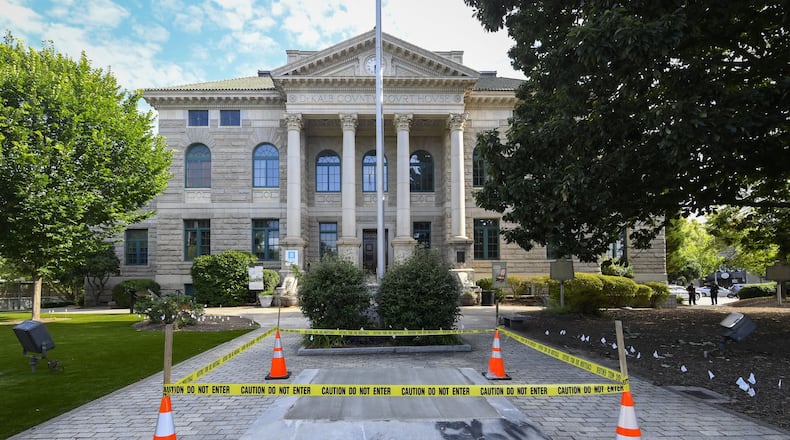A DeKalb County judge has dismissed a Confederate group’s lawsuit seeking to restore a Lost Cause monument to the downtown Decatur square.
The 30-foot Confederate obelisk had stood outside what’s now the Historic DeKalb Courthouse for more than a century but was removed in June 2020, after Superior Court Judge Clarence Seeliger formally declared it a public nuisance.
Seeliger, who has since retired, later issued another order prohibiting the controversial monument from ever being restored.
Nevertheless, the Georgia division of the Sons of Confederate Veterans filed a lawsuit in June that sought to have the obelisk — a tapering four-sided pillar with a pyramid on top — returned to its “former place of honor.” The suit suggested that officials from the county and the city of Decatur took “collusive action” to circumvent the state law protecting Confederate monuments.
DeKalb County officials had tried for several years to remove or relocate the monument but couldn’t find a way to do so — even before Georgia laws restricting such actions were tightened.
In 2019, the county settled for installing a contextualizing marker that called the obelisk an attempt to bolster “white supremacy and faulty history.”
Residents and activists kept the pressure on, however, and fresh focus was placed on the monument during last summer’s nationwide protests over police killings of Black Americans and systemic racism. It became a frequent target for protests and vandalism.
By June 2020, Decatur City Attorney Bryan Downs had filed a court petition asking that DeKalb County be ordered to take it down. Downs did not directly challenge Georgia’s Confederate monument law but called the obelisk a public nuisance and a threat to public safety.
Seeliger agreed, and it was removed..
The Sons of Confederate Veterans filed their lawsuit about a year later.
Last week, DeKalb County Superior Court Judge Yolanda Parker-Smith issued a new order granting motions filed by both the city and the county to dismiss the lawsuit.
Parker-Smith wrote that the Confederate group lacked standing to bring the suit or challenge the merits of Seeliger’s original order, and had not alleged “any concrete or particularized injury.”
The suit merely consisted of “complaining” that the obelisk’s removal violated Georgia’s Confederate monument law, the judge wrote.
Her ruling means the obelisk will remain tucked away in a county maintenance facility and out of the public eye. It also removes a legal hurdle for future plans at the site where the obelisk once stood.
A group led by DeKalb Commissioner Mereda Davis Johnson and Decatur Mayor Patti Garrett is working to bring a new monument honoring late Congressman John Lewis to the site.
About the Author
Keep Reading
The Latest
Featured


